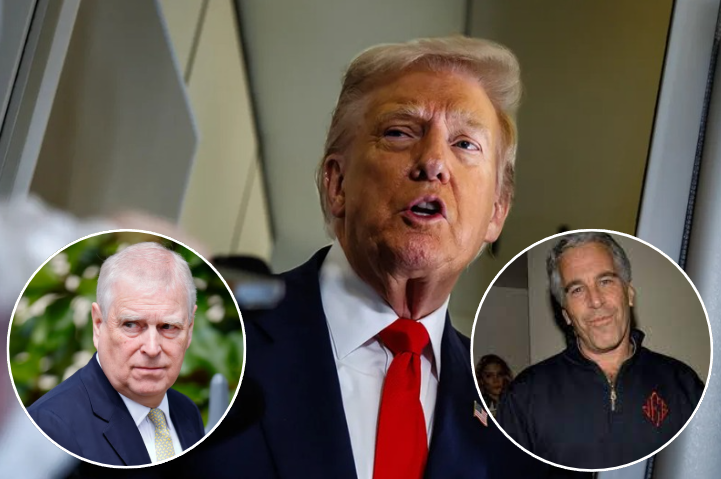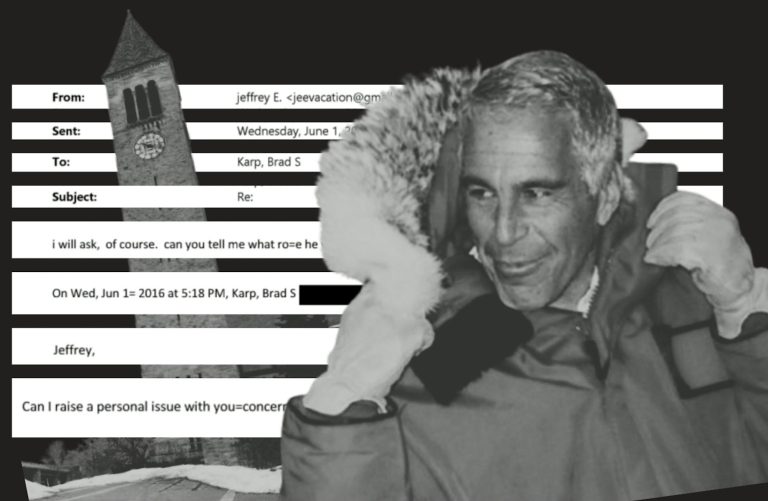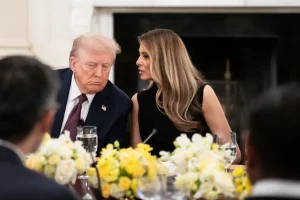President Donald Trump has weighed in on the high-profile decision to strip Prince Andrew of his royal titles, a move that has drawn global attention amid ongoing controversy surrounding the former Duke of York’s ties to Jeffrey Epstein. The announcement, made last week by Buckingham Palace, signals a historic moment for the British monarchy and has sparked reactions from around the world, including from the United States.
On October 30, Buckingham Palace confirmed that King Charles had formally removed all royal titles from his brother, Prince Andrew, and that the former royal would be required to leave his residence at Royal Lodge, Windsor. Andrew, once known as the Duke of York, will now be formally referred to as Andrew Mountbatten Windsor. The decision comes after years of mounting scrutiny over Andrew’s connections to Epstein, the convicted sex offender who died in jail in 2019, and Epstein’s accomplice, Ghislaine Maxwell.
The move is the culmination of a series of events that began in 2019, when Andrew stepped back from public royal duties amid growing controversy over his friendship with Epstein. The decision also follows the posthumous publication of Virginia Giuffre’s memoir, Nobody’s Girl: A Memoir of Surviving Abuse and Fighting for Justice, released on October 21. Giuffre detailed her experiences of sexual abuse at the hands of Epstein, Maxwell, and allegations of encounters with Prince Andrew when she was just 17.
Speaking from Air Force One, President Trump commented on the situation, expressing sympathy for the royal family while acknowledging the gravity of the events surrounding Andrew. “It’s a terrible thing that’s happened to the family,” Trump said. “That’s been a tragic situation. It’s too bad. I feel badly for the family.”
Prince Andrew’s connection to Epstein has been the source of significant public scrutiny. Giuffre alleged she was paid $15,000 to have sex with Andrew while underage, claims the former royal has consistently denied. In August 2021, Giuffre filed a civil lawsuit against Andrew in the U.S., which was later settled out of court for an estimated $15 million, without an admission of guilt from Andrew.
The recent developments in the case are compounded by newly surfaced emails and evidence suggesting continued communication between Andrew and Epstein after the financier’s release from prison. According to reports, Andrew sent a note to Epstein in April 2010, several months after Epstein had served time for charges related to the sexual exploitation of minors. Photographs of Andrew and Epstein meeting in New York’s Central Park later that year have also been published, though Andrew has claimed these meetings were intended to end the friendship.
The revocation of Andrew’s royal titles extends beyond ceremonial implications. Buckingham Palace confirmed that Andrew would surrender his lease on Royal Lodge, a Grade II listed property, and relocate to a residence within the Sandringham Estate in Norfolk, funded privately by King Charles. This decision, according to the Palace, was deemed necessary despite Andrew continuing to deny the allegations against him.
In its statement, Buckingham Palace emphasized its commitment to survivors of abuse. “Their Majesties wish to make clear that their thoughts and utmost sympathies have been, and will remain with, the victims and survivors of any and all forms of abuse,” the statement read. This stance reinforces the monarchy’s intent to distance itself from Andrew’s controversial associations while addressing public concern over accountability and ethical responsibility.
Trump’s brief remarks highlight the international resonance of the story. As a former U.S. president with a keen interest in global affairs, Trump’s acknowledgment of the situation underscores how the scandal has not only impacted the British monarchy but has also captured worldwide attention.
Prince Andrew’s loss of titles marks a significant departure from tradition within the royal family. Historically, members of the monarchy retain titles despite controversy, but the combination of legal settlements, public scrutiny, and the posthumous memoir of Giuffre created pressure for decisive action. For Andrew, the decision represents a formal public rebuke and a redefinition of his status within the royal hierarchy.
The situation also brings to light broader issues surrounding accountability, privilege, and the handling of high-profile sexual abuse allegations. Giuffre’s memoir, which details the abuse she suffered at the hands of Epstein and Maxwell, has drawn renewed attention to systemic failures that allowed such crimes to persist. Her tragic death earlier this year at the age of 41 has only intensified public focus on her story and the need for justice for survivors.
For Andrew, the loss of titles and residence is more than symbolic. It limits his public role, curtails access to state resources, and reshapes his identity in the eyes of the public. While he will continue to reside in the U.K., his private accommodations at Sandringham will mark a departure from the privileges associated with his former royal duties. The transition is expected to be discreet, with the King ensuring privacy while simultaneously asserting accountability.
Trump’s response, while measured, aligns with his broader approach to international controversies involving prominent figures. By expressing sympathy for the family, the former president acknowledges the personal impact of public scandal while refraining from judgment on Andrew’s legal standing or actions. This nuanced response contrasts with more critical media narratives and emphasizes Trump’s focus on the human element amid a high-profile international controversy.
The removal of Andrew’s titles may also have implications for the public perception of the British monarchy, both domestically and abroad. For decades, the institution has relied on ceremonial and symbolic authority, with family members’ behavior reflecting on the monarchy as a whole. By stripping Andrew of his titles, King Charles signals a commitment to ethical standards and a willingness to respond to public outrage, reinforcing the monarchy’s relevance in a modern context.
Meanwhile, Andrew’s legal and personal challenges are far from over. Settlements, allegations, and the publication of detailed accounts like Giuffre’s memoir ensure that scrutiny will continue, with potential ramifications for other members of the royal family and associated networks. The public’s interest in the case demonstrates the lasting impact of Epstein-related scandals on high-profile individuals across the globe.
Trump’s brief acknowledgment from Air Force One adds a layer of international perspective, highlighting that the ramifications of these scandals extend beyond the U.K. Borders, legal jurisdictions, and media coverage. As a global figure, Trump’s comments underscore the interconnectedness of modern public life and the ways in which controversies involving prominent figures resonate worldwide.
The developments surrounding Prince Andrew also underscore ongoing conversations about justice, responsibility, and privilege. While he has settled legal claims without admission of guilt, the public consequences—loss of title, relocation, and continued media scrutiny—illustrate that accountability extends beyond the courtroom. The monarchy’s decisive action signals a broader recognition that reputation, ethical conduct, and public trust remain central to the institution’s survival and legitimacy.
For historians, legal analysts, and political observers, this moment will likely be studied as a key turning point in modern royal history. The stripping of Andrew’s titles, combined with public acknowledgment by global figures like Donald Trump, represents a convergence of personal behavior, public accountability, and international awareness. It serves as a reminder that high-profile individuals are increasingly subject to scrutiny that transcends national boundaries.
In conclusion, Donald Trump’s remarks on Prince Andrew losing his royal titles provide a measured acknowledgment of a complex and tragic situation. The removal of titles by King Charles, prompted by the Epstein scandal and Giuffre’s posthumous memoir, marks a historic moment for the British monarchy. For Andrew, the consequences are significant: he loses both ceremonial recognition and residential privilege, symbolizing a broader reckoning with personal behavior and public accountability.
Trump’s words, brief but empathetic, underscore the global resonance of the situation and highlight the human dimension behind public scandal. As legal, personal, and ethical considerations continue to unfold, the eyes of the world remain fixed on the former Duke of York, the British royal family, and the broader implications for justice and accountability in the 21st century.
The Epstein scandal and its enduring impact, coupled with international reactions from leaders like Trump, demonstrate the continuing relevance of ethical conduct, institutional responsibility, and the ways in which global attention shapes the response to high-profile controversies. Andrew’s transition to private life, stripped of royal titles, marks the end of one chapter and the beginning of a protracted public reckoning that will likely reverberate for years to come.

Emily Johnson is a critically acclaimed essayist and novelist known for her thought-provoking works centered on feminism, women’s rights, and modern relationships. Born and raised in Portland, Oregon, Emily grew up with a deep love of books, often spending her afternoons at her local library. She went on to study literature and gender studies at UCLA, where she became deeply involved in activism and began publishing essays in campus journals. Her debut essay collection, Voices Unbound, struck a chord with readers nationwide for its fearless exploration of gender dynamics, identity, and the challenges faced by women in contemporary society. Emily later transitioned into fiction, writing novels that balance compelling storytelling with social commentary. Her protagonists are often strong, multidimensional women navigating love, ambition, and the struggles of everyday life, making her a favorite among readers who crave authentic, relatable narratives. Critics praise her ability to merge personal intimacy with universal themes. Off the page, Emily is an advocate for women in publishing, leading workshops that encourage young female writers to embrace their voices. She lives in Seattle with her partner and two rescue cats, where she continues to write, teach, and inspire a new generation of storytellers.









